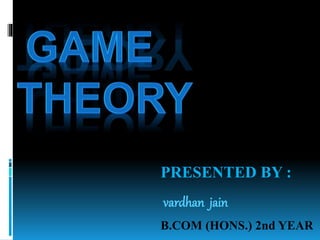
Game Theory History and Principles
- 1. PRESENTED BY : vardhan jain B.COM (HONS.) 2nd YEAR
- 2. History Of Game Theory The first known discussion of game theory occurred in a letter written by James Waldegrave in 1713 Von Neumann's work in game theory culminated in this 1944 book Theory of Games and Economic Behavior
- 3. MEANING OF GAME THEORY “Game theory is the study of interactive decision-making in the sense that those involved are affected by their own choices and by the decisions of others.”
- 4. Game theory V/S Decision theory Decision theory Game theory Decision theory is the study of how an agent can maximize its expected utility in situations where there are no other agents making choices. Game theory is the study of how agents can maximize their expected utility in situations where multiple agents make choices, and the payoff function of each agent depends on what all of the other agents do.
- 5. Game Theory use in life ● Parents trying to get children to behave ● Mangers trying to get worker to behave ● Businesses competing in a market ● Gamblers betting in a card game
- 6. THE PRINCIPLES OF GAME THEORY Each decision maker has two or more choices or sequences of choices ("plays"). All possible combinations of decisions or plays result in a clear outcome: win or lose. The scenarios have a well-defined outcome and decision makers receive a "payoff (the value of the outcome to the participants). That is, participants will gain or lose something depending on the outcome. The decision makers know the rules of the game as well as the payoffs of the other decision makers. The decision makers are rational: when faced with two alternatives, players will choose the option that provides the greatest benefits.
- 7. Extensive-form Extensive-form games generally involve several acts or stages, and each player chooses a strategy at each stage. The game’s information structure, i.e., how much information is revealed to which players concerning the game’s outcomes and their opponents’. Extensive-form games are generally represented using a tree graph
- 8. Normal form Games in normal form (strategic form) model scenarios in which two or more players must make a one-time decision simultaneously. These games are sometimes referred to a one-shot game, simultaneous move games. The normal form is a more condensed form of the game, stripped of all features but the choice of each player’s pure strategies, and it is more convenient to analyze.
- 9. Sequential Games look ahead and reason back Back up to the second-to-last decision
- 10. simultaneous games Turning to simultaneous games, it is immediately apparent that they must be handled differently, Because there is not necessarily any last move.
- 11. Cooperative game A game is cooperative if the players are able to form binding commitments Cooperative games focus on the game at large
- 12. Non cooperative games Non cooperative games are able to model situations to the finest details, producing accurate results
- 13. Symmetric game A symmetric game is a game where the payoffs for playing a particular strategy depend only on the other strategies employed, not on who is playing them. If the identities of the players can be changed without changing the payoff to the strategies, then a game is symmetric
- 14. Asymmetric games Asymmetric games are games where there are not identical strategy sets for both players. For instance, the ultimatum game and similarly the dictator game have different strategies for each player. It is possible, however, for a game to have identical strategies for both players, yet be asymmetric.
- 15. Zero-sum games Zero-sum games are a special case of constant-sum games, in which choices by players can neither increase nor decrease the available resources. In zero-sum games the total benefit to all players in the game, for every combination of strategies
- 16. Non-zero-sum games Non-zero-sum games, because the outcome has net results greater or less than zero. Informally, in non-zero-sum games, a gain by one player does not necessarily correspond with a loss by another.
- 17. Nash Equilibrium A Nash Equilibrium is a collection of strategies, one for each player, that are mutual best replies in the sense that each agent’s strategy is optimal given the strategies of the other agents A Nash Equilibrium demonstrates that no player has an incentive to deviate from his strategy given that the other players don’t deviate
